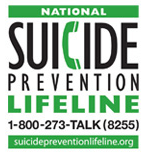Look for these environmental risk factors that can increase a person’s chances of becoming suicidal:
- experience of bullying or sexual abuse
- death of a family member or close friend
- family history of violence or suicide
- surviving a previous suicide attempt
The decision to kill oneself is rarely made in the moment; often times, the person will just state their intentions right out loud. Here are some behavioral warning signs to keep a lookout for:
- loss of interest in activities
- change in sleeping patterns–insomnia or excessive sleeping
- lost appetite or major change in weight
- mood swings, becoming depressed or isolated, acting enraged or easily irritable. These sudden changes can even include becoming calmer and happier
- talking about being in pain, feeling trapped or like a burden to others
- saying things, even jokingly, like “I want to kill myself” or “I have no reason to live”
- acting out sexually
- abusing alcohol or drugs
- giving away belongings; calling and visiting people to say goodbye
- looking for ways to kill themselves, such as collecting pills or trying to buy a gun
How do you talk to a friend who might be having thoughts of suicide? The time to act is NOW. First, find a safe and private place for the two of you to talk. Then, begin a conversation with them:
- start by telling your friend how much you care about them; ask them to be honest with you about their mental and emotional state–“Are you okay?”
- investigate further, to find the root of their burden: “Is something going on that you’d feel comfortable sharing with me?”
- tell them that some of their behavior has you concerned: “You haven’t been acting like yourself…” –be specific
- ask directly: “Are you thinking about suicide? Do you have a specific plan or date in mind?”
- people who are suicidal often believe they are beyond repair. Let them know: “You don’t deserve to die. I’d like to help you heal.”
- encourage them to seek professional help immediately: “Let’s find someone who can help and set up an appointment together. I can drop you off at CAPS in SUB 1 and pick you up.”
If your friend threatens suicide during your conversation, do not leave them alone. Call 911/Mason Police or the National Suicide Prevention Lifeline 1-800-273-TALK (8255). This IS a crisis situation. Remove guns, pills or sharp objects in the immediate are that they might try to use to hurt themselves.
Information from Wellcast Life-Saver.
(If you see unusual behavior in a friend or peer including mood changes, recklessness, anger, anxiety or withdrawal, and are worried about them, don’t hesitate to reach out and help them by being a g8keeper. If you feel comfortable, ASK THE QUESTION “Are you thinking about killing yourself?” or “Are you thinking about suicide?” This may seem intrusive, but studies have shown that when asked directly, persons contemplating suicide, being direct will help him/her feel understood.)
Call the Office of Student Support and Case Management at (703) 993-5376. They can outreach your friend and encourage them to seek help.
You can also always call a crisis hotline and ask them to help guide you when intervening with a friend in crisis. They can be reached at:
National Suicide Prevention Lifelife: 1-800-273-TALK(8255)
No matter what problems you are dealing with, we want to help you find a reason to keep living. By calling you’ll be connected to a skilled, trained counselor at a crisis center in your area, anytime 24/7.
CrisisLink: 1-800-SUICIDE
CrisisLink is a 24-hour help hotline that brings immediate help, hope, and healing to empower individuals facing serious life challenges, suicidal thoughts, emotional or situational problems.
Other Emergency Resources Include:
GMU Police – Department of Police and Public Safety (On Campus)
- Emergency – 9-1-1
- Non-Emergency – (703) 993-2810
CAPS-Counseling & Psychological Services (On Campus)
- During office hours (8:30 am-5:00 pm) call (703)-993-2380 or come to the office in SUB 1 Rm 3129 (3rd Floor)
- If CAPS is not open, contact the Mason Police at (703)-993-2810 or dial 9-1-1.

